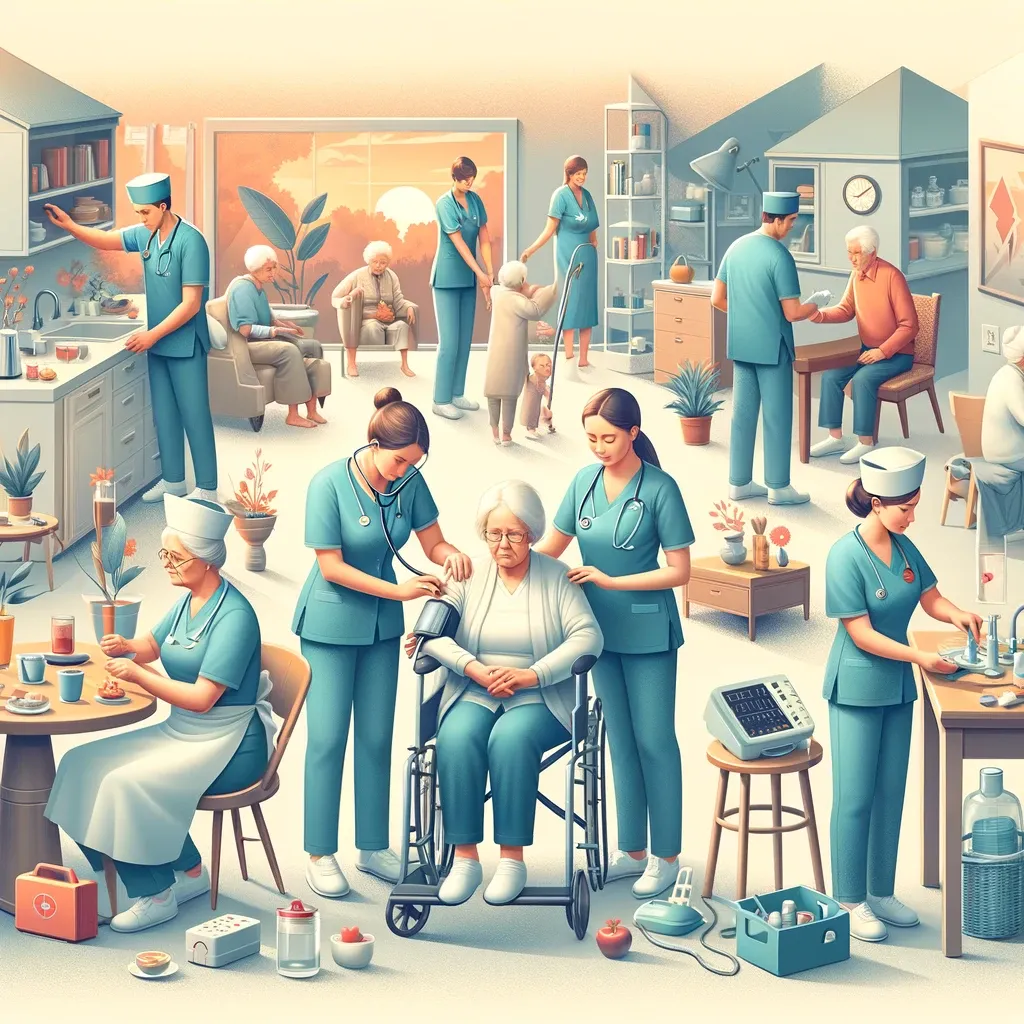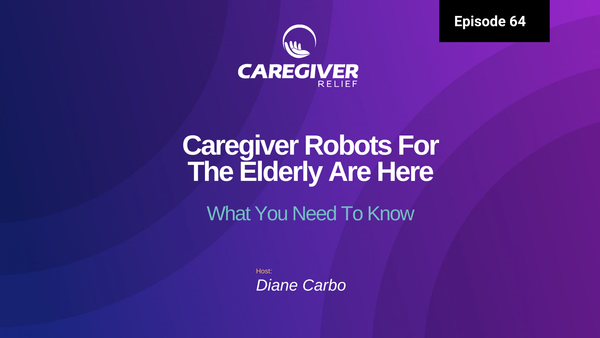Recognizing the Important Role of a Family Caregiver as Part of the Health Care Team
Discover the importance of family caregivers in the healthcare system and learn how to support them in providing the best possible care for their loved ones with chronic health conditions. A person-centered approach to care can help bridge the gap between medical professionals and patients.

Health Care Team Members include the primary caregiver and patient.
Family caregivers play a crucial role in providing care for their loved ones. With around 43 million caregivers in the United States alone, they are the ones who talk to doctors, drive to appointments, administer medication, and assist with daily tasks like bathing and dressing. They are on the front lines of care, but unfortunately, they are not always fully recognized as part of the formal health care team.
Changes in health care practices have led to family caregivers taking on more responsibilities. With shorter hospital stays and the management of complex diseases at home, caregivers are often tasked with medical duties. Surprisingly, almost half of them perform these tasks, such as wound care and pain management, without formal training.
Recognizing the critical role of family caregivers, efforts are being made to integrate them into the health care team. One example is the Caregiver Advise, Record, Enable (CARE) Act, which allows patients to record their caregiver's information in hospital records and requires hospitals to consult with caregivers regarding discharge plans and post-hospital care instructions.
While the CARE Act focuses on acute care settings, there are also initiatives to improve caregiver integration in community settings. The report "Families Caring for an Aging America" recommends strengthening the training and capacity of healthcare and social service providers to engage with family caregivers. However, there are challenges to effectively integrating and engaging caregivers.
The Health Care Team Includes the family caregiver
Discover the Vital Role of Family Caregivers in Patient-Centered Care
In the realm of healthcare reform, patient-centered care has taken center stage. However, amidst the discussion, one important presence often goes unnoticed: the family caregiver. With over 30 million family caregivers playing crucial roles in overseeing the well-being of individuals with acute and chronic illnesses, their contribution must not be overlooked.
Recognizing this significance, the American College of Physicians (ACP) has released a groundbreaking position paper that addresses the ethical considerations surrounding family caregivers. These caregivers act as pillars of support, assisting patients with daily activities, managing complex care, and navigating the healthcare system.
While hospice and palliative care programs acknowledge the impact of illness on patients and families, the traditional patient-physician relationship has primarily focused on the individual and their needs. Unfortunately, the patient's experience within their family and social relationships has been given less attention, as noted by the authors of the paper.
To address this issue, the ACP promotes a more inclusive approach to healthcare. Dr. Virginia Hood, chair of ACP's Ethics, Professionalism and Human Rights Committee, emphasizes the necessity of incorporating family members and friends into the care team saying, "as healthcare moves towards team-based care, we must examine the composition of those teams."
Recognizing the caregiver's value can ultimately lead to a positive caregiving experience, with potential benefits like reduced hospitalization and institutionalization rates for patients. By understanding the roles and ethical issues associated with caregivers, physicians can navigate the provider-patient-caregiver relationship more effectively.
The position paper, endorsed by 10 other professional medical societies, outlines four key principles for physicians and providers. These principles prioritize respect for the patient's dignity, rights, and values, effective communication and accessibility, recognition of the caregiver's value, and appropriate boundaries when the caregiver is a healthcare professional.
It's time to shed light on the vital role of family caregivers in healthcare. By acknowledging their contribution and addressing their needs, we can enhance the patient-centered care experience for all.
Let's Talk about the Team Approach To Care
I recently read an article by JESSIE GRUMAN, PHD. It introduces how the medical delivery system will soon be delivered with a “team” approach. I was excited to learn there will be “primary care teams” that will: Coordinate care. This will give more time to helping the patient and the family learn about how to take better care of themselves.
The article went on to say… the goal of these primary care teams would allow greater access and availability.. to the team… to answer questions and address minor issues. Dr. Gruman PHD, made some interesting observations … that I thought were noteworthy to share with you.
As a nurse and a caregiver, I am promoting a team approach to care. We have a public health crisis in the country. We have more seniors than youth for the first time in history. With the growing aging population, we are ill prepared to care for our elderly. There is also a shortage of direct care workers. Meaning there are not enough workers for the nursing home, assisted living and home care areas of health care. This shortage and the movement of aging in place has placed the burden of providing care to the family caregiver.
The statistics for the family caregiver are grim. The family caregiver is the single largest pillar of the long term care industry. They provide over $600 million dollars of unpaid care. Without the family caregiver our long term care industry would fall apart.
Caregiver Relief take a team approach to care. We are starting a grassroots effort to encourage family caregivers to build a Care Team Partner Support group to help you along your caregiving journey.
We also encourage creating a person centered care profile. This approach forces the medical professionals to see a person as an individual. And not, a diagnosis. It is so important that a family be able to sit with the care team and discuss long and short-term goals.
Family caregivers are an important part of this health care team. A primary care team typically includes family members, like family caregivers, to provide a well-rounded approach that can help ensure the best care for those with chronic health conditions.
The article offers several tips on how family caregivers can become active participants in their loved one's healthcare. It recommends family caregivers become familiar with the care plan, ask questions and participate in visits, connect with other family members to share information and keep records.
Family caregivers are an integral part of the health care team and can provide valuable insights that can help improve patient outcomes. By educating family caregivers on their role in the health care system, we can ensure the best possible care for those with chronic health conditions. Caregiver Relief has created How to Become a Patient Care Advocate for Your Family Member. This course will give you tips and strategies on getting organized, creating a care plan and even provides how to ask the right questions to get the information you need.
By understanding family caregivers’ role in the health care system, primary care teams can work together to provide a better experience at every stage of the medical journey. With family caregivers on board, primary care teams can offer more comprehensive and personalized care plans that promote positive outcomes for patients and families.
We all have a responsibility to make sure family caregivers have the resources they need to be effective members of the health care team. Through education, support, and collaboration, family caregivers can help ensure their loved one receives the best possible care. Together, we can create a more comprehensive healthcare system that is tailored to meet the needs of family caregivers, patients, and providers. We at Caregiver Relief have created courses, books and services to support the family caregiver throughout their caregiving journey.
I encourage family caregivers to create a person centered profile for their loved one. This helps family caregivers and care teams understand the individual’s health, behavior and communication preferences. With this understanding, family caregivers can make sure their loved ones receive the best possible care.
All of our guides, downloads, worksheets, Premium courses
Click Subscribe To Get Started.
I hope this article has helped you see the family caregiver as a vital part of your healthcare team. By working together, family members and medical professionals can create care plans that ensure the best outcomes for those with chronic health conditions. Let's continue to support family caregivers so they can provide the best possible care for their loved ones!
As a nurse with over 40 years experience, I have observed there is a big disconnect… between the medical professionals and the patients. Especially, in the area of dementia. Families living with a person with dementia become the experts. They know their family members capabilities, personality and past history.
With support of the medical professionals… the family of a person with dementia … can help them remain independent and in control of their life. For, as long as possible.
Our Resources section can help you find the information and tools that you need. We have courses, videos, checklists, guidebooks, cheat sheets, how-to guides and more.
You can get started by clicking on the link below. We know that taking care of a loved one is hard work, but with our help you can get the support that you need.
Click here to go to Resources Section now!
I would like to see a time when a person is diagnosed with dementia… and the medical team sets up regularly scheduled meetings… to discuss:
Long and short term goals
End of life issues
The type of dementia
And how it may affect behaviors and personality.
This ongoing interaction would not only be beneficial to the family… but to the medical professionals as well. So many medical professionals have the knowledge and understanding for a clinical perspective.
Many are unable to apply their knowledge to a practical setting such as the patients home. I have seen it over and over again. A family is is dealing with someone with no short-term memory … and discusses this with a medical professional.
Many of these patients can no longer be left alone for safety reasons. The family caregiver needs someone there to help them. Someone to stay.. with the patient, with dementia. Even if they just need to take a shower or do a load of laundry in another room. There is a consistent disconnect from the medical professionals to the needs of the family… to help them keep their family member at home as long as possible.
I also see this disconnect when a dementia patient is admitted to an alternative setting… such as Assisted Living.
A new setting is difficult for anyone, it can be overwhelming for a person with dementia. The medical professionals may recommend Assisted Living or a Nursing Home.
Taking a team approach… and developing a person centered profile can help make any transition easier.
Book Recommendation
In my book, Diagnosis of Dementia, What Do I Do Now? I take a step by step approach through the process of important issues … that need to be addressed… when a person is in the early stages of dementia.
In Dr. Gruman’s article, there are many questions that need to be answered… in regards to how this type of system would work.
My thoughts are that the family should insist on regularly scheduled meetings… to discuss the issues at hand. Developing a person centered profile… being prepared with a list of questions for the meetings… and allowing the person with dementia to have as much involvement… for as long as possible … will allow the team to see how the dementia patient may respond to things based on their personality.
This will allow the “team” to make educated decisions… based on the goals of the patient and family… the patients natural disposition… and also take into consideration managing other medical conditions a person may have.
Families of a person with dementia should embrace this “team” approach to care. Things are slow to change in the medical delivery system. If you are a family member or a person with dementia that wants to be involved with your care… until your dying breathe, it can be done. It takes a team approach… that includes the family caregiver… that will advocate for the the person with dementia. We have all the tools here to help you accomplish that goal. We are here to support you as you take this journey to have your family member seen as a person, and not just a diagnosis.
You might also like this article:






